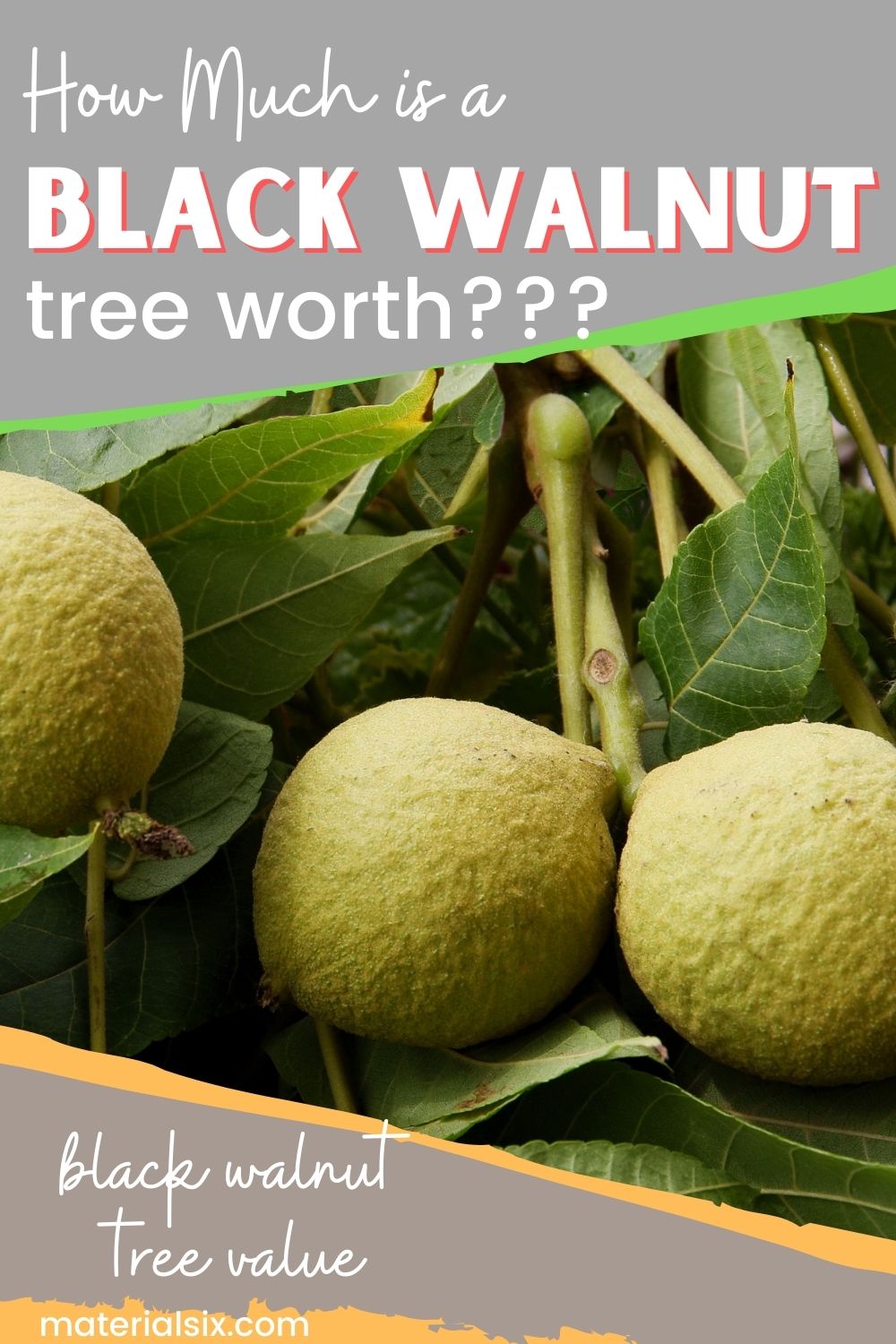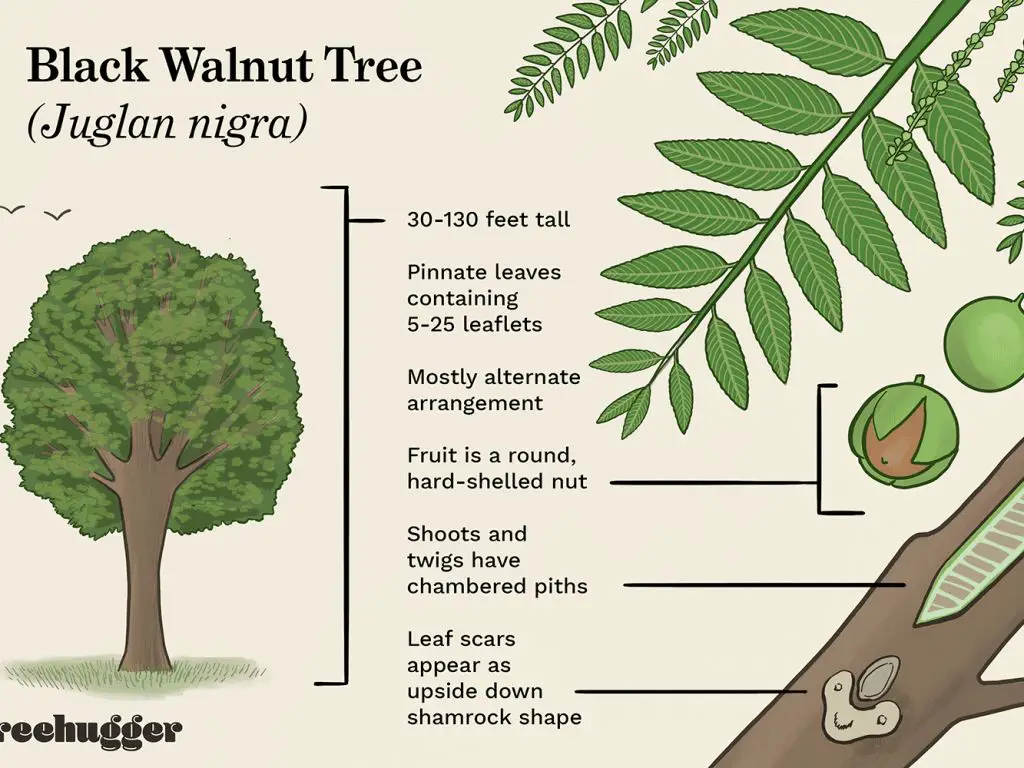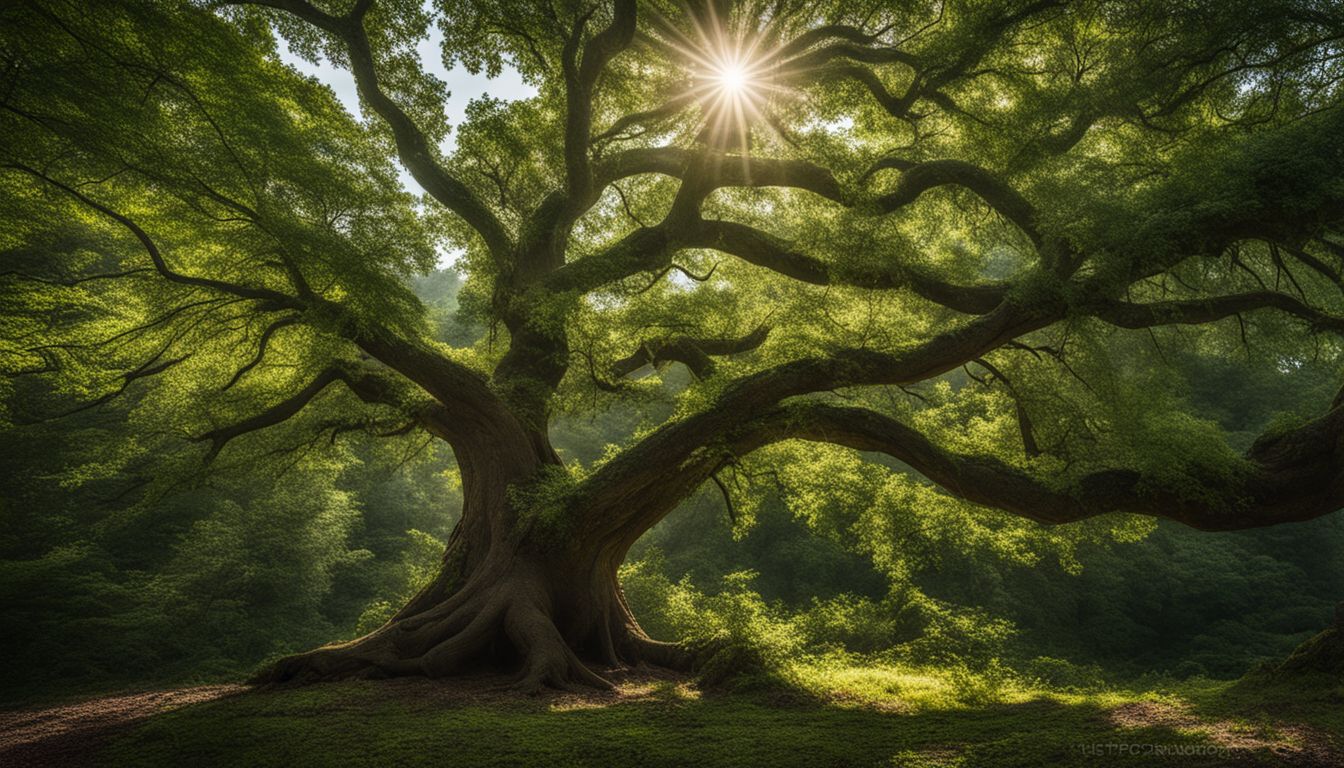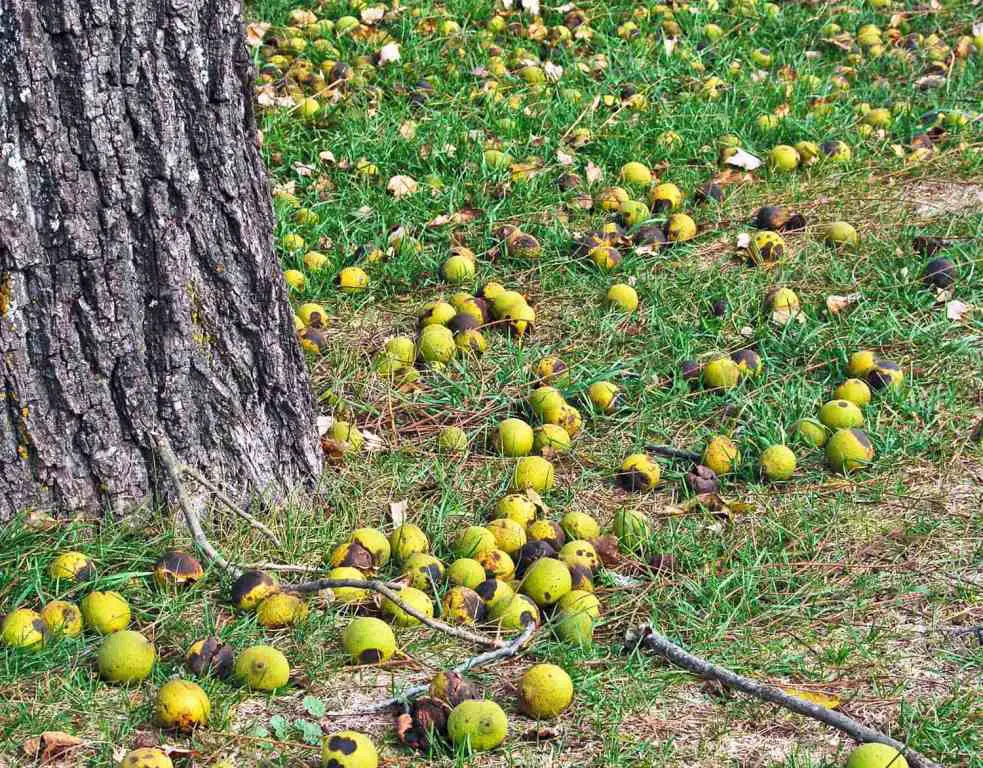Ever wondered how much your backyard black walnut tree might be worth? You might be surprised to learn that a mature black walnut tree can range in value from $1,000 to $10,000. This comprehensive guide will take you through the factors affecting their worth and current market prices.
So dive right in and discover what your very own black walnut could potentially yield!
Key Takeaways:
- The value of a black walnut tree can range from $1,000 to $10,000 based on factors such as age, size, condition, location, demand for black walnut wood, and the variety of the tree. Try our Calculator.
- Factors that impact the value of black walnut trees include their age and size, condition, location and environment, demand for black walnut wood, and the variety of the tree.
- Black walnut trees have common uses such as lumber for woodworking projects (furniture, flooring), veneer for covering materials (if it has Grade A veneer), sturdy furniture construction (desks, tables), unique flooring options with rich brown color and intricate grain patterns.

Factors That Impact the Value of Black Walnut Trees
Several factors can significantly impact the basic value of black walnut trees, including their age and size, condition, location and environment, demand for black walnut wood, and the variety of the tree. Understanding the black walnut tree value is essential for homeowners, timber merchants, and woodworkers alike.

Age and size
Among the various factors determining the worth of a black walnut tree, age and size hold significant importance. As trees mature, their value increases remarkably – some reaching values as high as $10,000 each. However, the value of individual trees can vary widely, even within the same acre, based on their unique characteristics. To ensure both buyer and seller satisfaction, establishing a fair price based on these factors is essential.
Generally speaking, taller and wider mature trees yield higher prices because they generate a larger volume of wood. Tree height is especially important as it directly affects the volume of lumber that can be harvested from the tree. For instance, an acre populated with mature black walnut trees can range in value from roughly $900 to $1,800 based purely on these physical attributes.
In essence, the older and larger your tree is, the more valuable it becomes in today’s market!
Condition
Black walnut trees in optimal condition harbor high value. The life of the tree greatly determines its health and subsequent wood quality. The quality of the wood is one deciding factor when it comes to assessing a tree’s worth. In perfect health, a mature black walnut tree produces lumber grade timber attractive to buyers across North America.
Conversely, diseases and pests can affect the quality and value of the wood drastically.
A well-maintained black walnut tree reflects exceptional quality and fetches premium prices from veneer buyers. Yard trees surrounded by open area might offer greater access ease for harvesting but could bear signs of stress or damage affecting their overall condition.
Factors such as health, structural integrity, defects like rot or unusual tapering also play into defining the eventual worth of the tree. Hence it is safe to infer that condition stands as one strategic variable determining current timber prices.
Location and environment
Black walnut trees thrive best in well-drained soil and open areas. This type of environment promotes the growth of a high-quality tree, therefore increasing its potential value. Some black walnut trees can be found as yard trees in urban neighborhoods, which can significantly hike up property values due to their appeal and rarity. Among the black walnut trees, a large tree often stands out, making it a focal point in any landscape.
An acre’s worth of these mature trees could differ in value based on location, weather conditions, and direct sunlight it receives per day. The location also impacts market demand; for example, on the east coast of the United States where there is great demand for black walnut lumber, you might fetch a higher price compared to other regions such as South Dakota.
Demand for black walnut wood
The high price of black walnut wood is influenced by several factors, including the age and species of the tree. Black walnut trees that are older and of a high-quality species tend to be in greater demand.
This is because they often produce lumber with exceptional quality and unique characteristics. In addition, the popularity of black walnut wood in various industries, such as woodworking and furniture-making, contributes to its high demand.
As a result, the value of black walnut trees can range from $1,000 to $10,000 each, depending on these factors.

Variety of tree
The variety of the black walnut tree plays a significant role in determining its value. Understanding the specific tree type is essential for accurate valuation. Different varieties have varying characteristics that can impact their worth. For example, Grade A veneer black walnut trees with a diameter of 19 inches can bring the owner $700-$800.
Additionally, exceptional size and quality trees are considered outliers and can fetch prices ranging from $300 to $1,000. So, when calculating the value of your black walnut tree, considering its specific variety is essential as it directly affects its market price.
How to Calculate the Value of a Black Walnut Tree

The best way to accurately determine the value of a black walnut tree is by considering multiple approaches and weighing their advantages. Calculating the value of a black walnut tree can be done by using a calculator, accurately measuring the tree, or hiring an appraiser.

Using a calculator
Calculating the value of a black walnut tree has been made easier with the use of calculators. These handy tools take into account factors like market prices and tree size to determine an estimated value.
By entering the measurements of the tree, such as its height and diameter, along with current market conditions, you can get a quick estimate of how much your black walnut tree may be worth.
Some calculators even consider the demand for walnut lumber when providing a valuation. With this information at hand, you can make informed decisions about selling or utilizing your valuable black walnut trees.
Ready to find out the value of your Black Walnut tree? Give our calculator a try below and get an instant estimate!
- Circumference (in inches): The circumference of a tree is the distance around its trunk, typically measured at breast height (about 4.5 feet above the ground) for consistency.
- Height (in feet): The height of a tree is the distance from its base to its topmost point.
Real-life Examples of Black Walnut Tree Sizes:
Young Black Walnut Tree (Approx. 10 years old)
- Circumference: Around 30 inches when measured at breast height (about 4.5 feet above the ground).
- Height: Approximately 25 feet tall.
Mature Black Walnut Tree (Approx. 50 years old)
- Circumference: Can be 80 inches or more when measured at breast height.
- Height: Can tower at a height of 60 feet or even more.
Note: It’s worth noting that these are just general examples. The actual size of a Black Walnut tree can vary based on numerous factors, including its age, genetics, soil quality, water availability, and more. Some trees might grow taller and thinner in dense forests due to competition for sunlight, while others might grow shorter and thicker in open fields with plenty of sun and space.
Accurately measuring the tree
To determine the value of a black walnut tree, it’s crucial to accurately measure its size. Start by measuring the diameter of the tree at chest height using a tape measure or calipers.
This measurement will be in inches and is essential for calculating the board foot volume of the tree. Measure both the smallest and largest diameters to account for irregularities.
Use conversion factors to calculate board feet based on these measurements, as it helps estimate how much usable lumber can be produced from the tree. Accurately measuring your black walnut tree allows you to have a better understanding of its potential value in terms of timber production or other uses such as veneer or furniture making.
Hiring an appraiser
Hiring an appraiser is crucial when assessing the value of a black walnut tree. An appraiser can accurately calculate the worth of the tree by using a board feet calculator to determine how many boards can be harvested from it.
With their expertise, they consider various factors such as age, size, condition, and the demand for black walnut wood in determining the value. By relying on an appraiser’s knowledge and calculations, you can ensure that you get an accurate assessment of your black walnut tree’s true worth.
The Current Market Prices for Black Walnut Trees
The current market prices for black walnut trees can vary depending on factors such as age, size, condition, location, demand for black walnut wood, and the variety of tree.

Average price per tree
Mature black walnut trees vary widely in price, with some fetching as little as $1,000 and others commanding prices of up to $10,000. On average, you can expect to sell a mature black walnut tree for around $300 to $1,000.
The exact price depends on factors such as the size and condition of the tree, its location and environment, and the demand for black walnut wood in your area. Keep in mind that these are just estimates; it’s always a good idea to consult with a local forester or timber buyer for a more accurate valuation based on current market conditions.
Factors that may increase or decrease the value
The value of a black walnut tree can be influenced by several factors. The first is the age and size of the tree, with larger and more mature trees often being more valuable. The condition of the tree also plays a role, as any blemishes or defects can decrease its worth. A single black walnut tree, due to its unique characteristics, might have a different market value than another tree of the same variety.
Location and environment are important too, as trees growing in well-drained soil and open areas tend to have higher value. Additionally, demand for black walnut wood can impact the price, with high demand driving up the value.
Lastly, different varieties of black walnut trees may have varying values based on their specific characteristics.
Common Uses for Black Walnut Trees
Black walnut trees have a variety of common uses, including lumber for woodworking projects, veneer for covering materials, sturdy furniture construction, unique flooring options, durable cabinets, instruments with warm tones, and even boat building.
Lumber for woodworking
Black walnut trees are highly sought after for their lumber, making them a valuable resource for woodworking. The wood from black walnut trees is known for its rich, dark color and beautiful grain patterns, making it a popular choice for furniture, flooring, cabinets, and even musical instruments. The cost of black walnut lumber can often be evaluated on a per square foot basis, aligning with its application in projects.
The value of the lumber can vary depending on factors such as the size and quality of the tree, but in 2022, it can range from $5 to $10 per board foot. This means that a mature black walnut tree could be worth anywhere from several hundred dollars to several thousand dollars in terms of its lumber alone.
Woodworkers and craftsmen prize black walnut lumber for its exceptional beauty and durability, making it a valuable asset in the world of woodworking.
Veneer for covering materials
Grade A veneer can greatly impact the value of a black walnut tree. The quality of the veneer is an important factor that determines how much the tree is worth. Veneer is a type of material used for covering surfaces, and it is often derived from black walnut trees.
When the grade of the veneer is high, it increases the overall value of the tree. The demand for black walnut timber also plays a role in determining the price of veneer obtained from these trees.
So, if you have a black walnut tree with excellent grade A veneer, it can be a valuable asset.
Sturdy furniture
Black walnut trees are highly valued for their wood, which is known for its strength and durability. Furniture made from black walnut can last a long time due to its natural resilience. This makes it an excellent choice for producing sturdy furniture items such as desks, tables, chairs, dressers, and shelves.
The dense grain pattern of black walnut wood not only adds to the furniture’s structural integrity but also gives it a beautiful natural look. Whether you’re furnishing your home or commercial space, investing in black walnut furniture can provide you with long-lasting pieces that will withstand daily use and retain their aesthetic appeal over time.
Unique flooring option
Black walnut wood is highly sought after for its premium quality, making it a popular choice for unique flooring options. With its rich brown color and intricate grain patterns, black walnut flooring adds a touch of elegance and sophistication to any space.
Whether you’re looking to create a rustic farmhouse feel or a modern contemporary look, black walnut flooring can seamlessly blend with various interior styles. Its durability and resistance to wear make it ideal for high-traffic areas in residential or commercial settings.
Considered one of the most valuable trees in North America, black walnut trees are readily available in the eastern United States, ensuring a sustainable source for this exceptional flooring material.
Durable cabinets
Black walnut trees are highly valued for their wood, which is known for its durability and strength. This makes it an excellent choice for crafting durable cabinets that can withstand daily wear and tear.
The value of a black walnut tree for making cabinets can range from $1,000 to $10,000 depending on factors such as age, species, and quality of the tree. With its beautiful grain patterns and natural resistance to decay and insects, black walnut wood ensures that the cabinets will last for many years while adding elegance and warmth to any space.
Instruments with warm tone
Black walnut wood is highly sought after for its warm and resonant tone, making it a popular choice for musical instruments. The unique properties of black walnut give instruments such as guitars, violins, and pianos a distinct sound that is rich and full-bodied.
Musicians appreciate the deep bass notes and the smooth, mellow tones that black walnut provides. Its warm tone adds depth and character to musical performances, making instruments made from this wood valuable assets for musicians seeking high-quality sound.
Boat building
Black walnut trees are highly valued for their wood, making them a popular choice in boat building. The wood quality and color of black walnut trees play an important role in determining its suitability for this purpose.
Native to the eastern United States, these trees can grow up to 100-120 feet in height, providing ample lumber for constructing boats. Depending on demand and market conditions, the price of black walnut wood for boat building can range from $1,000 to $10,000.
It’s worth noting that black walnut trees have allelopathic properties that may impact their suitability for boat construction.
Benefits of Black Walnut Tree

Following are the benefits that will clear your mind about the question of how much is a black walnut tree worth.
1. Providing Shade
The main reason behind growing and keeping those mature trees is that they provide shade. People are often ready to pay up any price for that too. Black walnut trees are large enough to cover up a significant area under them.
2. Chestnuts
There is a great demand for black walnuts for adding them up with chocolate flavors. It does not mean that you can never have black walnuts while living in an urban city.
If you have sufficient time and resources, you can have your regularly maintained orchard and grow them there.
3. Christmas Trees
It is the era now that people have opted for artificial Christmas trees for ease, but they can never give you the same vibe as the real ones.
These black walnut trees have considerable height and diameter that you can decorate with ornaments and lights for the season and stand out in the whole street.
Conclusion
Understanding the value of black walnut trees is important for landowners and those in the timber industry. Factors such as age, size, condition, location, demand for black walnut wood, and variety all impact the overall value of a tree.
Calculating the value can be done through various methods such as using a tree value calculator or hiring an appraiser. Currently, market prices for black walnut trees range from $1,000 to $10,000 depending on these factors.
The wood from mature black walnut trees is highly sought after and can be used for various purposes including lumber for woodworking, veneer for covering materials, sturdy furniture construction, unique flooring options, durable cabinets crafting musical instruments with warm tones and even boat building.
Seeking professional advice before selling a tree is recommended to ensure getting fair prices in line with current market conditions. Overall understanding the factors that impact the value of a black walnut tree allows landowners to make informed decisions about their valuable assets.
Importance of understanding the value of black walnut trees
Understanding the value of black walnut trees is crucial for property owners and anyone involved in timber production. These trees can be a valuable asset, with mature black walnut trees worth anywhere from $1,000 to $10,000 each.
By knowing the worth of a tree, individuals can make informed decisions about whether to sell it or use it for other purposes such as woodworking or furniture making. Additionally, understanding the factors that influence the value of black walnut trees allows people to maximize their profits and negotiate fair prices when dealing with buyers or log yards.
So take the time to learn about tree valuation and seek expert advice if needed; it could make a significant difference in your financial gain.
Factors to consider before selling a tree
Before selling a tree, there are several factors that you should consider. First and foremost is the size of the tree, including its height and diameter, as this can greatly influence its value.
Additionally, you should assess the quality of the wood, as high-quality timber will fetch a better price in the market. It’s also important to keep in mind the current supply and demand for black walnut trees, as this can impact their value.
Finally, if you have a yard tree or live in an urban neighborhood, selling a black walnut tree could significantly increase the value of your property.
Seeking professional advice
Professionals play a crucial role in helping you determine the value of your black walnut tree. They have accurate information about current market prices and can assess factors like size, age, and wood quality that influence its worth.
With their guidance, you can use a board feet calculator to accurately calculate the tree’s value. Professionals also dispel misconceptions about all walnut trees being worth thousands of dollars or more.
By consulting with experts, you gain insights into the impact of supply and demand on the value of black walnut trees, ultimately helping you make informed decisions when selling or harvesting them.
FAQs
1. What is the current market price for a black walnut tree?
The value of a black walnut tree varies widely based on factors like tree size and quality. Prices can range from hundreds to thousands of dollars per single tree.
2. How does the type and size of a Black Walnut Tree impact its value?
Large, high-quality black walnut trees – especially veneer quality trees with large diameters – fetch the highest prices due to their great timber value and demand by interior designers.
3. Does location influence how much my Black Walnut Tree could be worth?
Yes, having your tree in the right place at the right time influences how much money you could make; long-term planning boosts its potential value.
4. Can I sell just one individual black walnut tree?
Absolutely! Single, large black walnut trees can hold great value if they meet certain criteria such as good health, average height above first branch, and lack of toxic plants around them.
5. How do I know what’s a good price for my Black Walnut logs?
Tree experts calculate log prices using measurements like diameter of a tree (small end) and square footage (bd ft). However, gun stocks made from good quality black walnuts bring in some of the highest prices.
6.How can I maximize my profit when selling my Black Walnut Tree?
Understanding factors that influence timber prices gives you an edge during negotiations. The easiest way to get best price is through maintaining your trees’ health over its lifetime thereby enhancing basic values like height, diameter etc impacting overall best value.
More from Materialsix: